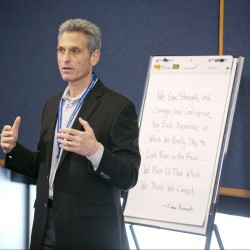Surreal is Webster’s Dictionary 2016 word of the year. From the Brussels and Paris attacks to the election, emotions were high and answers didn’t come easily. And, as we enter into a new year, the status of healthcare in American remains a bit of a mystery. If it were possible to collectively monitor the blood pressure of every human being in 2016, we would have all been put on medication. At Today’s Practitioner, we would like to put 2016 behind us and offer up a healthier word introduced to us from a contributor, Dr. Adam Perlman. The word is mindfulness.
 Unlike stress-minded thinking that keeps us spinning in a whirlwind of negative thoughts, mindfulness frees up the brain to be productive. “Practicing mindfulness deepens self-awareness and fosters self-regulation such that our actions rise from a clear well rather than the muddy waters of emotional and mental turmoil,” writes Perlman in his essay, Informed Mindfulness as the Foundation for Leadership.
Unlike stress-minded thinking that keeps us spinning in a whirlwind of negative thoughts, mindfulness frees up the brain to be productive. “Practicing mindfulness deepens self-awareness and fosters self-regulation such that our actions rise from a clear well rather than the muddy waters of emotional and mental turmoil,” writes Perlman in his essay, Informed Mindfulness as the Foundation for Leadership.
The scientific word is metacognition. Elementary schools are using mindfulness learning techniques to help students destress and learn more effectively, as this study from BMC Psychology shows. And not surprisingly medical schools and hospitals like Georgetown and Mayo Clinic, in which the everyday makes election years look downright tame, are adopting mindfulness training as a way to help students and staff enhance awareness, reduce burnout, combat negative moods and improve resilience. And though not the purpose, doctors and medical school participants report a sense of calm and relaxation even in heightened stress situations.
 Perlman, who leads the Duke University Leadership Program in Integrative Care, says for your medical practice, mindfulness can take on many forms. Taking time to decompress and destress is important, but not always practical in a midst of a patient’s medical situation or a pressing staff need. Perlman suggests aligning priorities with the values that are at the core of integrative medicine. “Sit back and take a broader look at all the things that integrative health principles could bring to the health system,” he says in Balancing Priorities as Integrative Health Providers.
Perlman, who leads the Duke University Leadership Program in Integrative Care, says for your medical practice, mindfulness can take on many forms. Taking time to decompress and destress is important, but not always practical in a midst of a patient’s medical situation or a pressing staff need. Perlman suggests aligning priorities with the values that are at the core of integrative medicine. “Sit back and take a broader look at all the things that integrative health principles could bring to the health system,” he says in Balancing Priorities as Integrative Health Providers.
Years like the one we’ve just had trap us into focusing on what can’t be done. Instead, look for what can be done. Practical examples include ways to address staff burnout, healthy eating for patients and practitioners, stress management and employee retention. “So we should scan our environment and say, ‘Given what I know, based on the relationships that I have and my understanding of the priorities of individuals at various levels and those of the overall organization, where do I have the best opportunity to make an impact and bring value?,'” Perlman writes.
In conclusion, he says, “Self awareness and reflection often lead naturally into a more informed state — an idea triggers reflection and that reflection leads to a new way of being. I think you can also see how developing informed mindfulness makes a big difference in one’s ability to lead.”
For more articles written by Perlman and his staff, follow this link: Integrative Care Leadership.
by Kimberly Lord Stewart, Content Director for Today’s Practitioner





